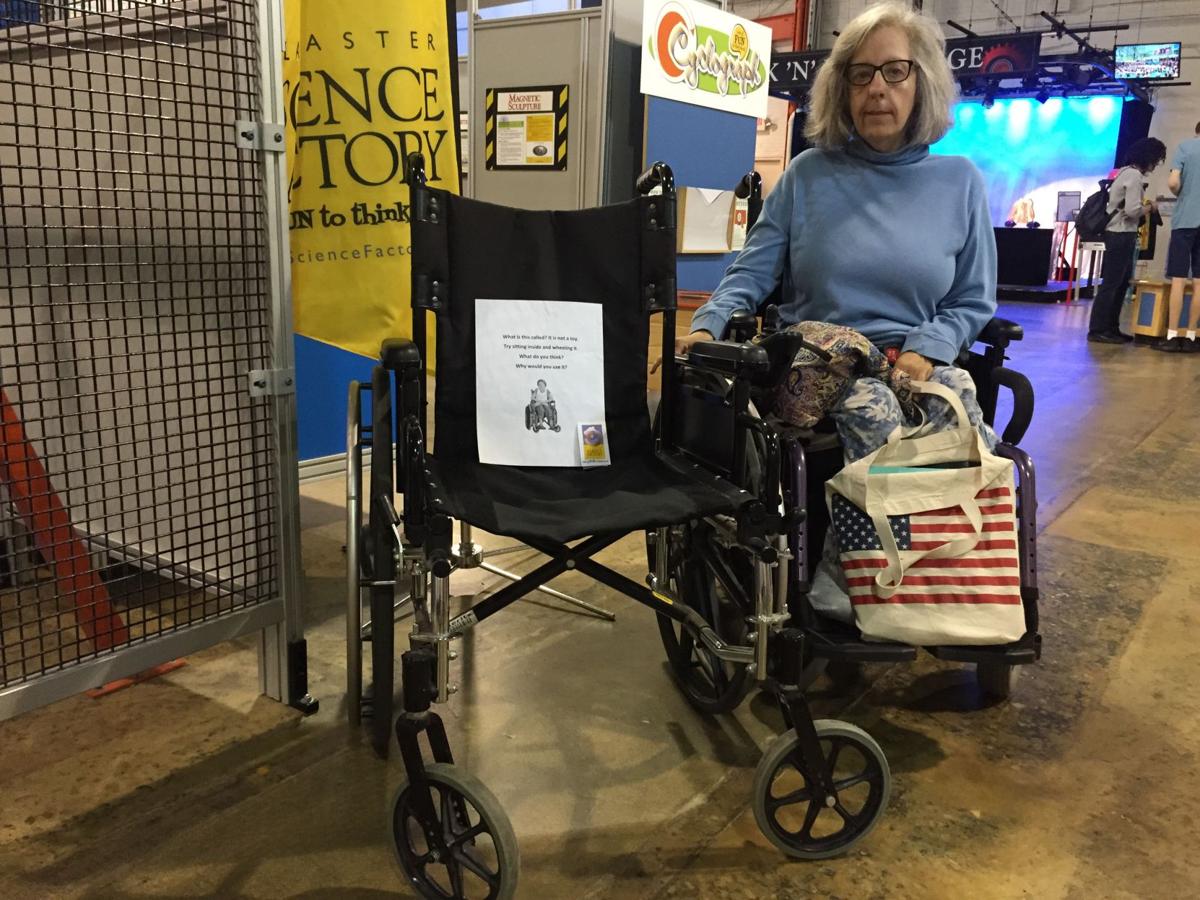Lancaster woman offers wheelchair rides to break down barriers, teach empathy and understanding
 Susan Schaffer poses next to the wheelchair she uses as a tool for creating empathy and understanding at the Lancaster Science Factory
Susan Schaffer poses next to the wheelchair she uses as a tool for creating empathy and understanding at the Lancaster Science FactoryDisability advocate Susan Schaffer introduced a new ride at the Lancaster Science Factory this summer: a manual wheelchair that takes muscle and precision to spin through the museum’s active exhibits.
Long an advocate for people with disabilities, the Lancaster resident saw an opportunity to expand her reach through the hundreds of summer campers who flock to the building’s educational exhibits. Stationed next to an interactive display teaching mechanical advantage, her chair became a tool for creating empathy and understanding.
“It’s not a toy, but it’s a great experience to have so you can see that people in chairs are the same as anyone else,” says Schaffer, 59. “My hope is that right now, a couple weeks later, they’ve seen someone in a wheelchair and made that connection.”
Growing up in Bethlehem, Schaffer’s chair often set her apart, initially making her hesitant about participating in some activities or talking to people about her physical differences.
But she quickly learned that to get the most out of life, she’d have to adapt and embrace her ability to think outside the box.
Over the years, she has taught school-based programs in the Lehigh Valley, provided respite for parents of children with disabilities while teaching their children coping skills and worked with disabled veterans learning to navigate the world following injury and loss. She has also been employed as a recruiter, seeking businesses to hire individuals who have physical or cognitive disabilities.
Wheelchair rides
She approached the Science Factory in late spring and asked if she could offer wheelchair rides to anyone who might be interested, knowing a wheelchair can sometimes act as a physical barrier between two people.
Schaffer has made it her mission to be approachable and answer questions, something she once bristled at.
Early in life, she hated to be asked why she needed a wheelchair.
“It made me feel different,” she said. “Now it’s very important to me to be out there and educate, not alienate.”
One of her big concerns is that young people learn early that people who use wheelchairs aren’t necessarily intellectually different.
“That becomes a stereotype that can be very harmful to a person — keep them from a job or other opportunities,” Schaffer says.
People with physical disabilities, she says, can participate in workplace conversations and decision-making and learn trade skills without much extra training. Accommodations, ranging from a different desk to a doorway ramp to a custom van like the one Schaffer drives, can enable someone to do things they might otherwise have been unable to.
“I’m always thinking of new ways to bring awareness to that in unique ways,” Schaffer says.
The museum has a track record of inclusivity, regularly hiring volunteers with developmental or physical disabilities. On a recent Friday, several volunteers from Excentia, a Lancaster County nonprofit that provides support to people with developmental needs, cleaned exhibits as part of a skill-building pre-employment program.
Bob Herbert, director of operations at the Science Factory, says Schaffer’s project was also a useful reminder for museum staff about design and function.
“It was a good test,” Herbert says. “I really thought about, do I have three feet of space between each exhibit? Will she be able to get in and out? We don’t have automatic doors.”
Schaffer says she felt welcome. In addition to the chair, she displayed photos of people using wheelchairs while working, dancing, skiing and getting married. She also shared tips on starting conversations with people with disabilities.
Teaching and speaking have become second nature to Schaffer, who faced moments of isolation as a girl. Through her Infobility organization, she volunteers with Team River Runner, a kayaking group that helps veterans with disabilities and other people with vision impairments conquer paddling sports.
She also delivers community-based programs on communicating with people who have disabilities and customized presentations on the benefits of and myths about hiring workers with disabilities.
She says her own parents still worry about her independent streak, which blossomed long before American society became intentionally inclusive.
Schaffer went to Hofstra University and holds a master’s degree in vocational rehabilitation. She lives in Lancaster, in an apartment community she says has been willing to make changes — like installing low-pile carpet — that improve her mobility and independence.
She says many people still fear wheelchairs because they worry they could end up in one eventually. It’s important for her to make others see the chair is a way of broadening a life, not limiting it.
“Everything has gotten better than it used to be for people with disabilities,” she says. “If you are in a wheelchair, it’s not impossible. Everything is possible, and everybody has something to offer.”
Via @Lancaster Online

